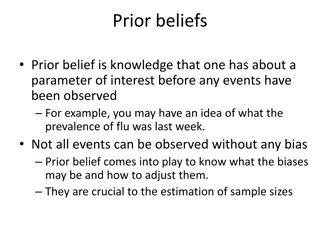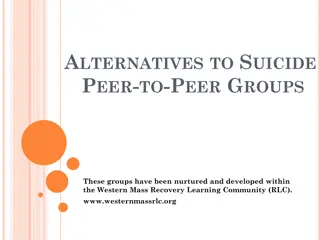Understanding Values, Beliefs, and Personal Values in Everyday Life
Our values and beliefs shape how we think, act, and make decisions in everyday life. Whether conscious or not, they influence our behavior and attitudes. This article explores the definitions and importance of beliefs, values, and personal values, highlighting how they impact individual decision-making. It also touches on the sources of beliefs and the process of transforming beliefs into personal values.
Download Presentation

Please find below an Image/Link to download the presentation.
The content on the website is provided AS IS for your information and personal use only. It may not be sold, licensed, or shared on other websites without obtaining consent from the author. Download presentation by click this link. If you encounter any issues during the download, it is possible that the publisher has removed the file from their server.
E N D
Presentation Transcript
Person Centred Care Rozi Hamilton Lead Nurse for Practice Education, ELFT London Community Nursing Services. Newham Training Hub Nursing Collaborative Nurse Adviser 2021
Whether or not we are aware of it, we all live our everyday lives by a set of values that shape how we think and react. Values are beliefs and ideas about how people should behave which have been formed by our childhoods, families, backgrounds, cultures, religions and relationships.
Behaviour how you act Attitude How you think about and approach a situation Values What s important to you Beliefs Ideas you hold to be true
What is a belief? A belief is an idea that a person holds to be true. A person can base a belief upon certainties (e.g. mathematical principles), probabilities or matters of faith. A belief can come from different sources, including: a person s own experiences or experiments, the acceptance of cultural and societal norms (e.g. religion), what other people say (e.g.education or mentoring). A potential belief sits with the person until they accept it as truth, and adopt it as part of their individual belief system. Each person evaluates and seeks sound reasons or evidence for these potential beliefs in their own way. Once a person accepts a belief as a truth they are willing to defend, it can be said to form part of their belief system.
What are your beliefs? What do you hold to be true? mentors culture beliefs faith experience education
What is a personal value? Values are stable long-lasting beliefs about what is important to a person. They become standards by which people order their lives and make their choices. A belief will develop into a value when the person s commitment to it grows and they see it as being important. It is possible to categorise beliefs into different types of values examples include values that relate to happiness, wealth, career success or family. A person must be able to articulate their values in order to make clear, rational, responsible and consistent decisions.
What are your values? What is important to you? Happiness Family Values Career success Wealth
Achievement Change and Variety competence Compromise Common ground co-operation democracy Dignity Encouragement Excellence Friendships Honesty Inclusion Independence Intellectual status Leadership Learning Meaningful work Public service Responsibility Security Opportunity Caring Unity commitment confidence courtesy Creativity Decency do your part hard work equality Helping others individuality justice Influencing others Involvement loyalty listening personal growth Recognition quality Status passion teamwork efficiency Appreciation competition Close relationships compassion courage dedication Decisiveness Ethical practice education hope Fun/enjoyment harmony determination kindness Integrity knowledge market position making a difference Power & authority Reputation respect support perseverance trust politeness accountability
What is an attitude? Attitudes are the mental dispositions people have towards others and the current circumstances before making decisions that result in behaviour. People primarily form their attitudes from underlying values and beliefs. However, factors which may not have been internalised as beliefs and values can still influence a person s attitudes at the point of decision-making. Typical influences include the desire to please, political correctness, convenience, peer pressure and psychological stressors. Can you think of a time this has happened to you? The potential for these influences to sway attitudes will be greater if the person has not clearly thought through their beliefs and values. This process includes considering the principles by which they might reconcile or prioritise competing values. A lack of self-awareness or critical insight, or the presence of ambivalence or uncertainty about values can lead to a less rational attitude to choices and ultimately to undesirable behaviour.
How do your beliefs and values affect your attitude to people and to work? How can people tell this?
Core Values in Health and Social Care What are they?
Alongside legislation such as the Care Act (2014) there are guiding principles on how care is delivered. Whilst we each have our own values there are values which are important for working in health and social care. Six values are now recognised as applying to health and social care workers. These are known as The 6 Cs : Care: having someone s best interests at heart and doing what you can to maintain or improve their wellbeing; maintaining their privacy and dignity Compassion: being able to feel for someone, to understand them and their situation , treat them with respect and dignity and maintaining their rights as individuals Competence: to understand what someone needs and have the knowledge and skills to provide it Communication: to listen carefully but also be able to speak and act in a way that the person can understand Courage: not to have fear to try out new things or to say if you are concerned about anything Commitment: dedication to providing care and support but also understanding the responsibility you have as a worker
Another way of looking at the 6 Cs is that each individual must be placed at the centre of their care and support. It must fit the individual, rather than the individual being made to fit existing routines or ways of doing things. People are unique every person has got their own needs which are different from everybody else s This is known as person centred working. Person centred values tell you how to work in a person centred way. Person centred values are the guiding principles that help to put the interests of the individual receiving care or support at the centre of everything we do. The person is at the centre If someone is in the centre of something, they are the most important person. This means that other people cannot be more powerful or make decisions about the person's life that they do not agree with.
Promoting person-centred values in everyday work This means carrying out your role in a way that respects the people you work with so that they can live the life that they choose This should not be any different from what you would want or expect should you need care and support. Always be aware of the individual person that you are providing the service for. You may see these values expressed in the following way: individuality, independence, privacy, partnership, choice, dignity, respect, rights, equality and diversity, confidentiality (standards for care) In the course of your work you may come across the term personalisation . Personalisation is about enabling people to be more in control of the services they receive.
Person-centred support is about valuing and respecting the person who is being supported, tailoring our care to the needs of the person we are caring for. What sort of care you would like to receive?
I want the people who care for me to: Comments from people who are being supported in health and social care Help me do as much as I safely can for myself Be careful not to embarrass me Be polite to me and my family Share what they know about me only with people who need to know. Let me be alone when I want Most important of all, I want the people who care for me to ask me how I want to be cared for and listen to me when I tell them If the people who care for me cannot look after me in the way I want, then I hope they will explain why not and find another way to care for me that I am happy with
Person centred planning is used in social care and has four key rules: 1. The belief that an individual can plan for themselves. The focus needs to be on their strengths and abilities; for example, an individual who wants to make their own decision about which mobility aids they would like to use to support them to walk short distances rather than use their wheelchair. 3. The individual has as much control as possible over the choices they can make; for example, the individual is supported to try to use the walking frame. 2. The care plan is written in the first person to make clear that it is the individual who owns it; for example I would like to try a walking frame when I am moving around the house and for short distances outside rather than using my wheelchair . 4. The plan is there to make the individual s life better, not to fit them into an existing service. For example, the frame that is sourced is best for them within the resources available or they are able to find a frame from somewhere else if necessary.
Peter is 78. He is diabetic which has affected his eyesight and mobility. He is very independent and is the carer for his wife Ellen. They have been married for 55 years and have no children. Ellen has dementia and Peter is finding it increasingly difficult to care for her. Peter has accepted carers to help with the day to day care of Ellen, but still wants to be involved. How would you make sure you provided person centred care to Peter and Ellen
Person-centred is about providing care and support that is centred or focused on the individual and their needs. We are all individual and just because two people might have the same medical condition, for example, Dementia, it doesn't mean that they require the same care and support. There are eight person centred values that support person-centred care and support. These are: Individuality Choice Independence Privacy Dignity Rights Empowerment Partnership Privacy and dignity will be covered on a separate day of this course
Individuality: Each person has their own identity, needs, wishes, choices, beliefs and values. One size fits all does not work when it comes to providing care and support. Individuals should be allowed and supported to make their own choices. Care and support needs should be tailored to suit each individual. This shows respect by preserving the individual's dignity and individuality. Their personal beliefs should be respected Choice: Individuals should always be involved in decisions about their care and support and be supported to make choices. They should be given information in a way that they can understand so they can make informed choices. When working with individuals who cannot express their wants, needs and wishes in words, you must find other ways of communicating. Additional training and supervision can help you to develop these skills. Independence: Promoting an individual s independence means to look at what they can do for themselves and empowering them to do as much as possible for themselves. It does not mean leaving them to cope alone but agreeing the support they need and want. Allowing the individuals you support to do things for themselves, however small. Don't do things for them because it is quicker. Support them to do things that they can do or almost do. Independence makes people feel in control of their lives and gives them a sense of self- worth.
Partnership: support. You work in partnership when you involve the individual and their family and work alongside other workers. working in partnership with others is essential to person-centred care and The key to a successful partnership is good communication and trust; valuing and respecting what others have to say, sharing appropriate information and putting the individual s best interests at the centre of everything that is being done Empowerment means to give the individual you care for the confidence, voice and power to speak out on their own behalf and to feel in control of their actions. Rights: The Human Rights Act 1998 is the main legislation that sets out the rights of people in the UK. You have the right to speak your mind and be kept safe from harm, as well as the right to respect, dignity and equality. You should make sure an individual s rights are respected, not only by yourself but by other people involved in their care. Individuals you care for should continue to have the same rights as when they were living independently - the right to say no, the right to have a relationship and the right to have a say about how they are supported. They have a right to choose what they eat and when, how they dress and when. They have the right to choose their friends and what they want to do with their time. You may have to make changes to take an individual's rights into account. You may have to balance an individual's rights against your responsibilities and consider if either the individual or yourself are at risk.
Respect: - This is showing an individual you will support them in what they believe is important, whatever their age, culture, disability, gender, belief or sexual orientation. You should never ignore the individuals you are supporting and should always include them in the conversation, irrespective of the subject. You should be careful not to use a term of endearment, without asking the individual what they would like to be called. Some people dislike terms of endearment, others will approve, either way, you can never assume it is acceptable and it is essential to check.
Your role is to help people choose the way their care needs are met and to help them plan for the longer term. People s choices will be different depending on the types of tasks you are doing together and their abilities. If a person makes a decision that you feel is risky, discuss your concerns with them (and your manager/supervisor), and if possible support them to understand the risks.
To provide care and support that respects the individual s wishes, needs and preferences, you will need to find out what you can about them depending on your workplace. Taking time to find out about their personal history by talking with them or reading any information you have will give you a deeper insight into their likes and dislikes. This will help the care plan to be put together with them.























